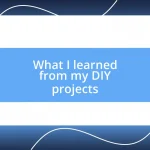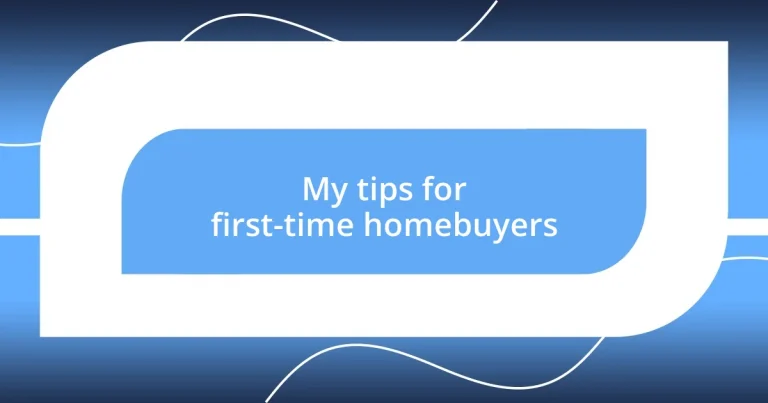Key takeaways:
- Get pre-approved for a mortgage early to gain clarity on your budget and streamline your home search.
- Consider all associated costs when setting your budget, including property taxes, insurance, and maintenance expenses.
- Conduct thorough home inspections to uncover potential issues and ensure you’re making an informed investment decision.
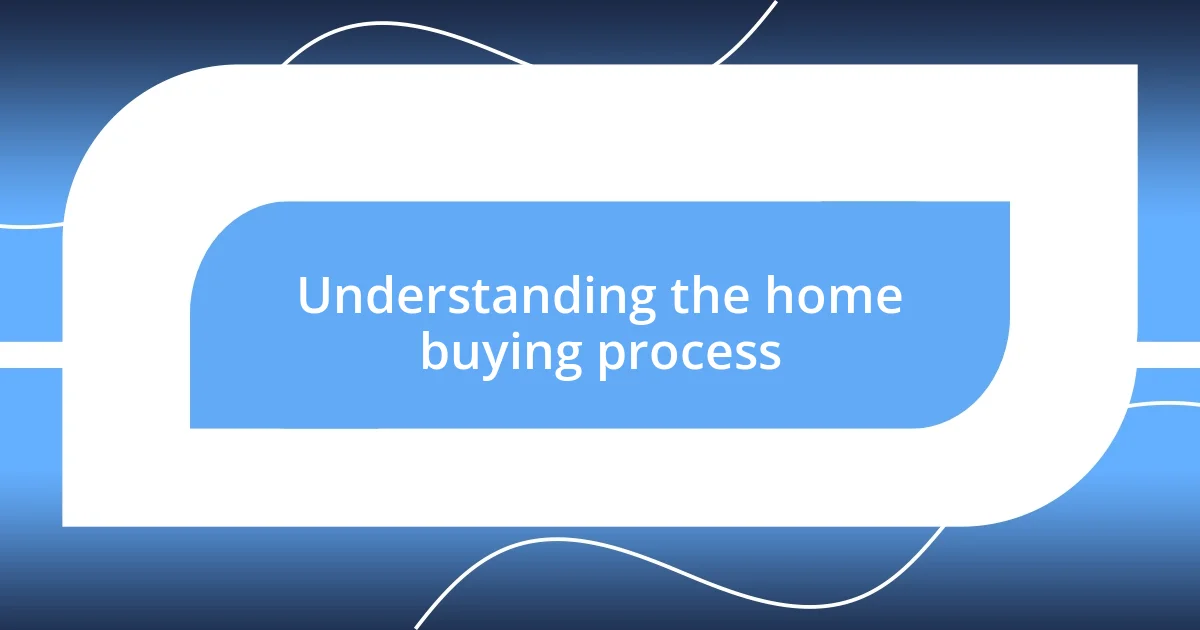
Understanding the home buying process
Understanding the home buying process can be a bit daunting, but it’s essential to break it down into manageable steps. I remember my first time navigating this world. I felt overwhelmed by the paperwork and endless options. Have you ever felt paralyzed by too many choices? It took me a few deep breaths to realize that taking it one step at a time made all the difference.
Another thing I learned was the importance of getting pre-approved for a mortgage early on. When I got my pre-approval, it felt like I finally had a ticket to the concert I had been waiting for! It gave me clarity and confidence in my budget. Plus, knowing how much you can afford helps narrow down your search, making the process feel less like a roller coaster and more like a joyful ride toward your future home.
Finally, I can’t emphasize enough how crucial it is to research neighborhoods and communities. When I was looking for my first home, I would spend weekends driving around different areas, soaking in the vibe. It made me think: where do I feel most at home? Finding a neighborhood that aligns with your lifestyle can ensure that you’re not just buying a house, but truly investing in a happy future.
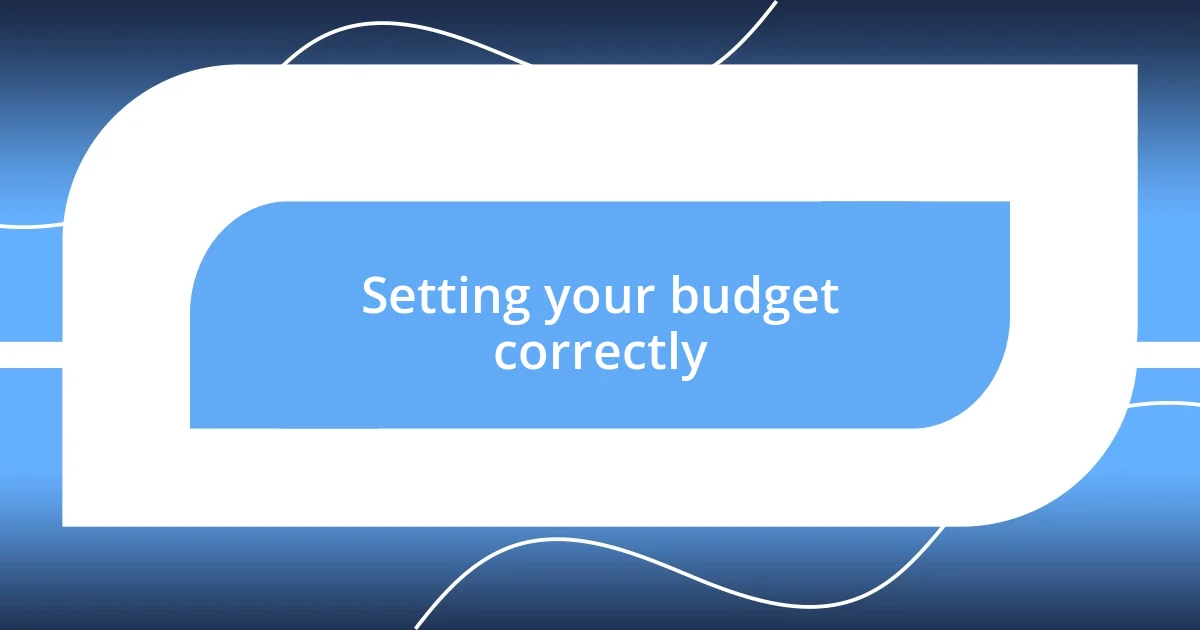
Setting your budget correctly
Setting your budget correctly is one of the most crucial steps in the home buying process. When I began budgeting for my first home, I vividly recall feeling both excited and a bit anxious about the figures dancing in my head. I realized that it’s about more than just the purchase price; it’s essential to include all associated costs. These costs can sneak up on you if you’re not vigilant.
Here’s a rundown of what to consider when you’re figuring out your budget:
- Monthly Mortgage Payment: Know how much you can afford without stressing your finances.
- Property Taxes: These can vary significantly based on location.
- Homeowners Insurance: Be sure to get quotes early.
- HOA Fees: If applicable, account for these recurring costs.
- Maintenance Costs: I learned the hard way that setting aside at least 1-2% of your home’s value yearly for repairs is wise.
- Closing Costs: Don’t forget these; they often range from 2-5% of the home’s price.
The clarity I gained from creating a detailed budget helped me filter out homes that were out of reach and focus on what truly matched my financial situation. Every dollar matters, and being informed allows first-time homebuyers to feel empowered rather than overwhelmed.
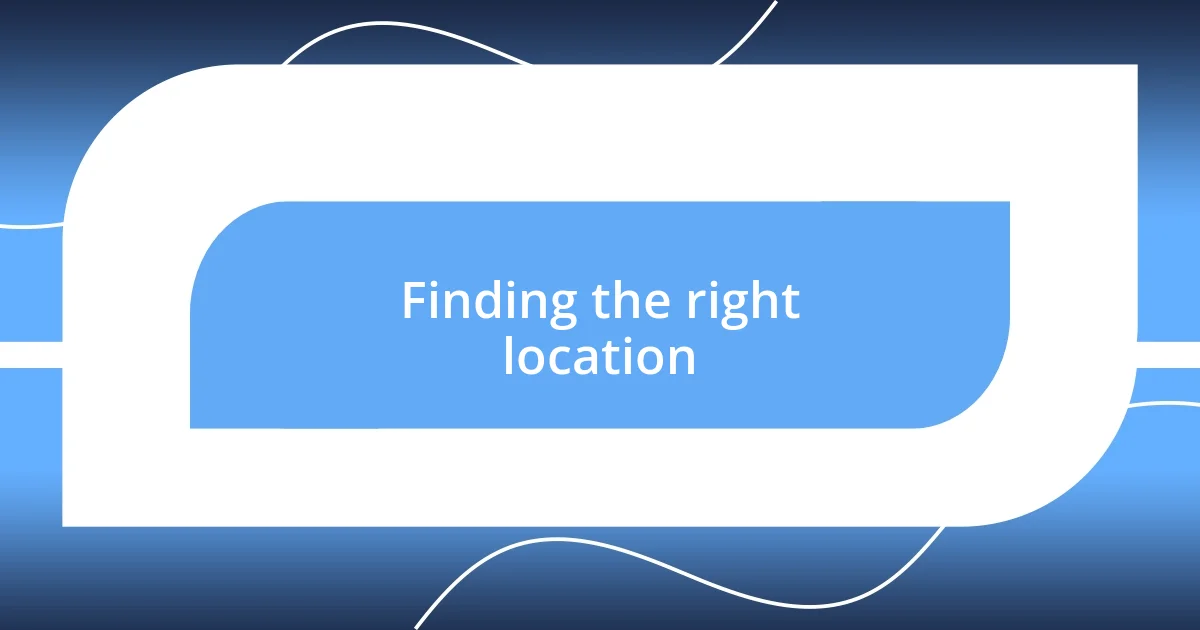
Finding the right location
Finding the right location is a pivotal aspect of home buying that can make or break your experience. I distinctly recall standing in a potential neighborhood and feeling an unexpected sense of belonging. It’s often said that “location, location, location” is the key mantra in real estate. I can attest to this; the right area not only meets your lifestyle needs but also sets the stage for a fulfilling living experience. Have you ever walked through a neighborhood and immediately felt a sense of peace or excitement? That’s a sign you might be onto something.
Another layer to consider is ensuring that the neighborhood complements your long-term goals. For instance, my first home was near excellent schools, which I hadn’t initially prioritized. Shortly after moving in, I appreciated this foresight when my family started to grow. Knowing that property values typically rise where good schools exist made me feel even more secure in my investment. It’s important to think ahead. Will the location suit your future needs as well?
To really nail down the right spot, a comparison of key factors can help guide you. Below is a simple table that breaks down some essential considerations for evaluating different locations.
| Factor | Importance |
|---|---|
| Proximity to Work | Reduces commute time, improves work-life balance |
| School District Quality | Affects home value and children’s education |
| Amenities (Parks, Stores) | Enhances quality of life and convenience |
| Safety/Crime Rates | Impact on personal safety and peace of mind |
| Community Vibe | Cultural fit improves overall happiness |
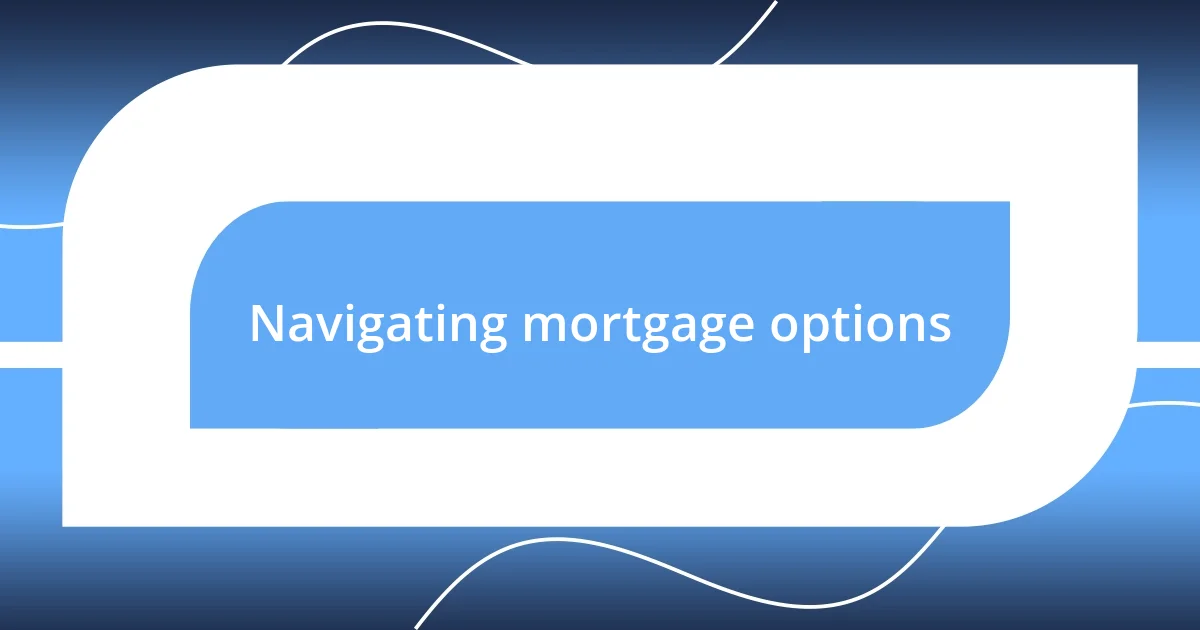
Navigating mortgage options
Navigating mortgage options can often feel like trying to decipher a new language. When I first explored my mortgage choices, I was overwhelmed by terms like “fixed-rate,” “adjustable-rate,” and “APR.” It was a lot to digest! I quickly learned that understanding the difference between these options is essential for making informed decisions. A fixed-rate mortgage offers stability with a consistent monthly payment, while adjustable-rate mortgages can fluctuate, usually starting at a lower rate. Which one fits your risk tolerance better?
One thing that really helped me was working with a mortgage broker. They helped clarify the intricacies of different loans, and I felt like I finally had a partner in the process. I remember sitting down with my broker and going through scenarios based on my finances. The light bulb moment came when I realized how different loan terms could significantly alter my monthly payment. Do you have a strategy in mind for finding the right mortgage fit?
Additionally, keep an eye on current interest rates. When rates are low, locking in a good mortgage can save you thousands over the life of the loan. I was fortunate to purchase my home during a favorable rate period, and it made all the difference in my budget. Staying informed about rates and market trends empowered me, reminding me that a little research can lead to substantial financial benefits.
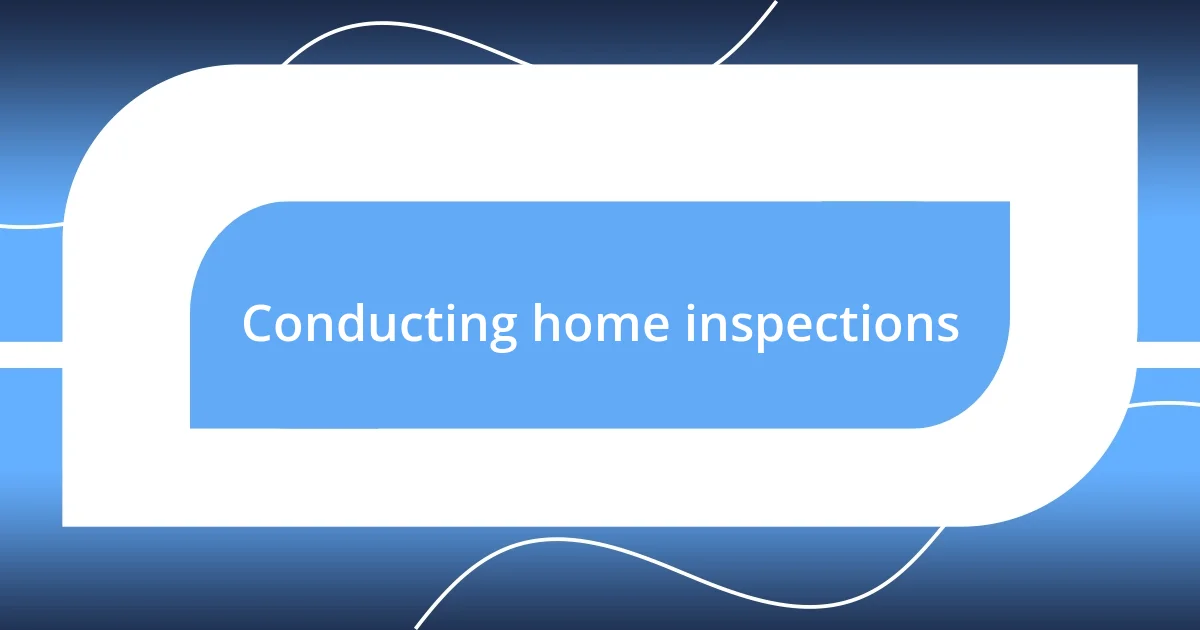
Conducting home inspections
Conducting a home inspection is one of the most vital steps in the home-buying process. I vividly remember my first inspection; I was both excited and anxious as I walked through each room. Just looking at the space was one thing, but it was the inspector’s detailed analysis that really opened my eyes. Did you know that even minor issues, like dampness in the basement, can lead to significant problems down the line? It’s crucial to pay attention to these details.
During the inspection, I found it invaluable to ask questions as we went along. I recall pointing out what seemed like a simple wall crack, only to discover it could indicate a structural issue. The inspector’s explanations helped me understand the gravity of different findings. I often think back to how those insights empowered me to make better choices during negotiations. How can you ensure you’re fully aware of what you’re getting into? Having a knowledgeable inspector by your side makes all the difference, as they highlight potential red flags that can save you from future headaches.
Additionally, I learned that a thorough inspection goes beyond the visible aspects of the home. I remember a time when the inspector used specific tools to identify plumbing problems hidden behind the walls. Those unexpected discoveries reinforced the importance of bringing in a professional. They can uncover issues that aren’t immediately obvious, which can ultimately protect your investment. Have you ever thought about what might be lurking beneath the surface in your future home? Conducting a home inspection underscores the idea that knowledge is power.
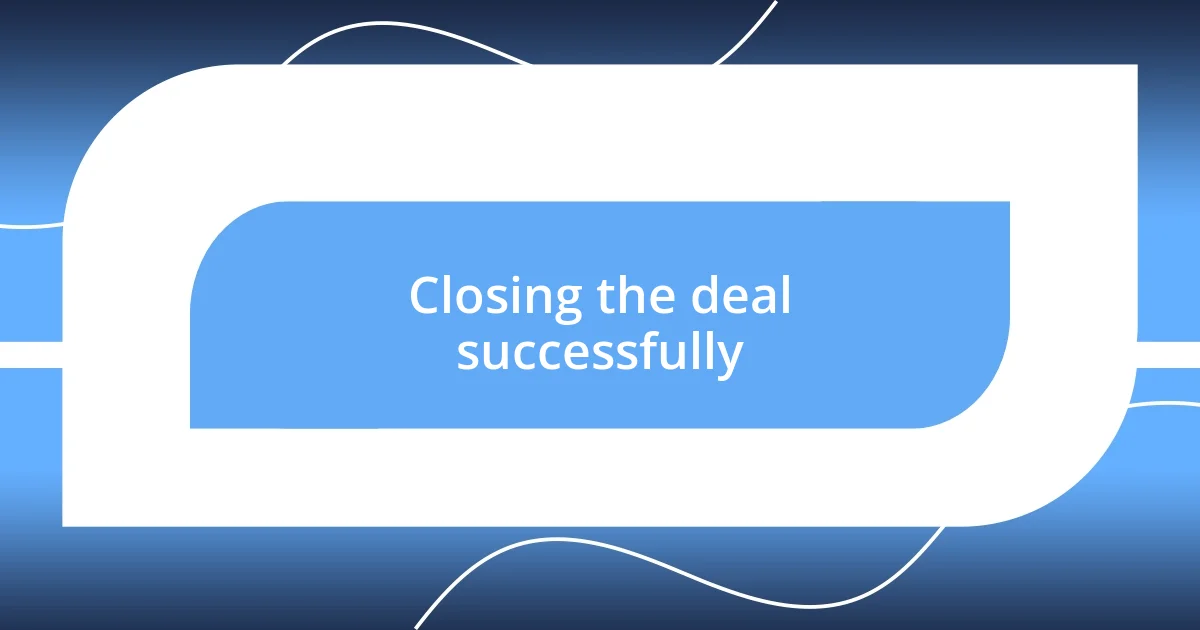
Closing the deal successfully
Closing the deal successfully requires careful attention to detail and a solid understanding of the process. When I got to this stage, the excitement was palpable, but so were the nerves. I recall the moments leading up to the closing, filled with a mix of anticipation and anxiety—would everything go smoothly? Being prepared with a list of questions and documentation helped me feel more in control. Have you thought about what documents you need to bring to ensure a seamless process?
As the closing day approached, I learned the importance of reviewing all the closing documents in advance. Initially, I was overwhelmed by the stack of papers. However, after spending some time going through everything with my real estate agent, I felt a wave of relief wash over me. Understanding key terms like “title insurance” and “closing costs” made a significant difference as I signed on the dotted line. It’s astonishing how clarity can transform anxiety into confidence, isn’t it?
Finally, having a reliable team of professionals by your side cannot be overstated. I remember feeling secure knowing that my attorney and agent were there to address any last-minute concerns. Their expertise reassured me that I was making the right decisions, especially when unexpected questions popped up during the negotiation of the final terms. With the right support, you can navigate complexities easily, turning what could be a stressful day into a celebratory milestone. What steps will you take to build your support team?




